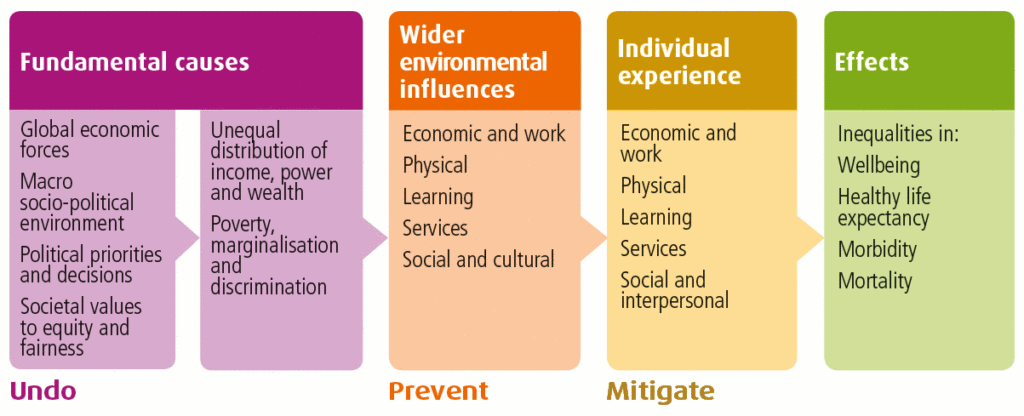First of all, I’d like to thank all of the amazing registered (and associate) nutritionists and dietitians that shared my tweet and answered the call in support of this month’s campaign! In the Caribbean and North America, we celebrate Black History Month in February. So imagine my surprise when I moved to the U.K to study and realised BHM was October – one of the best months of the year, in case you didn’t know. Despite the differences, I’m taking February to Nourish Diversity in Nutrition & Dietetics. We’ll be interviewing registered nutrition professionals and a few students from all over the world! How exciting!
I am very blessed to come from a majority black country where healthcare is free (although there could be significant improvements). While I was aware of health inequalities and the social determinants of health, learning about it from an ethnicity-based standpoint was very eye-opening.
What are health inequalities?
Health inequalities are the unjust and avoidable differences in people’s health across the population and between specific population groups.
Public Health Scotland, 2021
The fundamental causes of health inequality include an uneven distribution of wealth leading to marginalisation and poverty.

Who do they affect?
Black, Asian, Indigenous and other ethnic minority groups are particularly susceptible to health inequalities. A 2001 study reporting on the impact of racial health inequalities in America, stated
“from 1980 to 1998, average numbers of excess deaths per day among American blacks relative to whites increased by 20%”.
Levine, R. S., Foster, J. E., Fullilove, R. E., Fullilove, M. T., Briggs, N. C., Hull, P. C., Husaini, B. A., & Hennekens, C. H. (2001).
While in the U.K. the Black Report from 1980, was disapproved by the current Secretary of State for Social Services, for identifying that
“health inequalities were not mainly attributable to failings in the NHS, but rather to many other social inequalities influencing health: income, education, housing, diet, employment, and conditions of work. “
Gray, A. M. (1982)
The Marmot Review -“Fair Society, Healthy Lives” was another key report, published in 2010, which identified and strategised reducing health inequalities in the U.K. Over time, some of the indicators have been incorporated into public health policy. However, there are still widening gaps in health outcomes among social and economic groups. It’s a complex and deep-rooted problem presenting challenges for governments to alleviate.
If COVID-19 has taught us anything, it’s that race-based health inequality is still a major problem in societies with minority BAME populations.
Why is representation and showing diversity important?
I think I was also quite lucky to attend London Met which is well-known for the diversity of its students, from their ages, backgrounds and ethnicities. Coming from a majority black country, this was really important to me, and enhanced to my student experience. I never felt alone during my studies, which is not the case for many. However after graduating- and even considering Nutrition as a career- I found information was often dominated by images of Caucasian persons and didn’t fully show the diversity there was in the field.
A Standard University study, where black men were paired with black and non-black general practitioners had the following findings:
- Black men were more likely to engage with black physicians and even consented to preventive services like cardiovascular screenings and immunizations.
- While the black doctors wrote more detailed notes on their patients.
There appeared to be trust built in someone who looked like them. When healthcare professionals and patients share the same race or ethnicity, this improves the time they spend together, health literacy, treatment discussion, screening routines and clinical outcomes. Aside from research, lived experiences have shown similar results.
As registered nutrition professionals, we also have a vital role in improving health outcomes, particularly in populations facing health inequalities. Despite many may think our role involves being the food police, or the diet brigade, ultimately having black registered nutritionists and dietitians means that our communities are in a better place to reduce preventable health conditions.
I hope you enjoy this month’s featured interviews with registered dietitians, nutritionists and students from around the world, and feel free to chat with them on their social media pages!
References & Further Reading
Public Health Scotland. (2021). What are health inequalities?. Public Health Scotland. Retrieved 25 January 2021, from http://www.healthscotland.scot/health-inequalities/what-are-health-inequalities.
Levine, R. S., Foster, J. E., Fullilove, R. E., Fullilove, M. T., Briggs, N. C., Hull, P. C., Husaini, B. A., & Hennekens, C. H. (2001). Black-white inequalities in mortality and life expectancy, 1933-1999: implications for healthy people 2010. Public health reports (Washington, D.C. : 1974), 116(5), 474–483. https://doi.org/10.1093/phr/116.5.474
Gray, A. M. (1982). Inequalities in Health. The Black Report: A Summary and Comment. International Journal of Health Services, 12(3), 349–380. https://doi.org/10.2190/XXMM-JMQU-2A7Y-HX1E
Marmot, M. Fair society, healthy lives : the Marmot Review : strategic review of health inequalities in England post-2010. (2010) ISBN 9780956487001. http://www.parliament.uk/documents/fair-society-healthy-lives-full-report.pdf
Marmot Review report – ‘Fair Society, Healthy Lives | Local Government Association
Health Equity in England: The Marmot Review 10 Years On | The Health Foundation
Mishra, V., Seyedzenouzi, G., Almohtadi, A., Chowdhury, T., Khashkhusha, A., Axiaq, A., Wong, W., & Harky, A. (2021). Health Inequalities During COVID-19 and Their Effects on Morbidity and Mortality. Journal of healthcare leadership, 13, 19–26. https://doi.org/10.2147/JHL.S270175
Health Inequalities During COVID-19 and Their Effects on Morbidity and Mortality (nih.gov)
Health Inequality Actually Is a “Black and White Issue”, Research Says (uofmhealth.org)
Racism in Healthcare Is Putting Black Women’s Lives at Risk (oprahmag.com)

